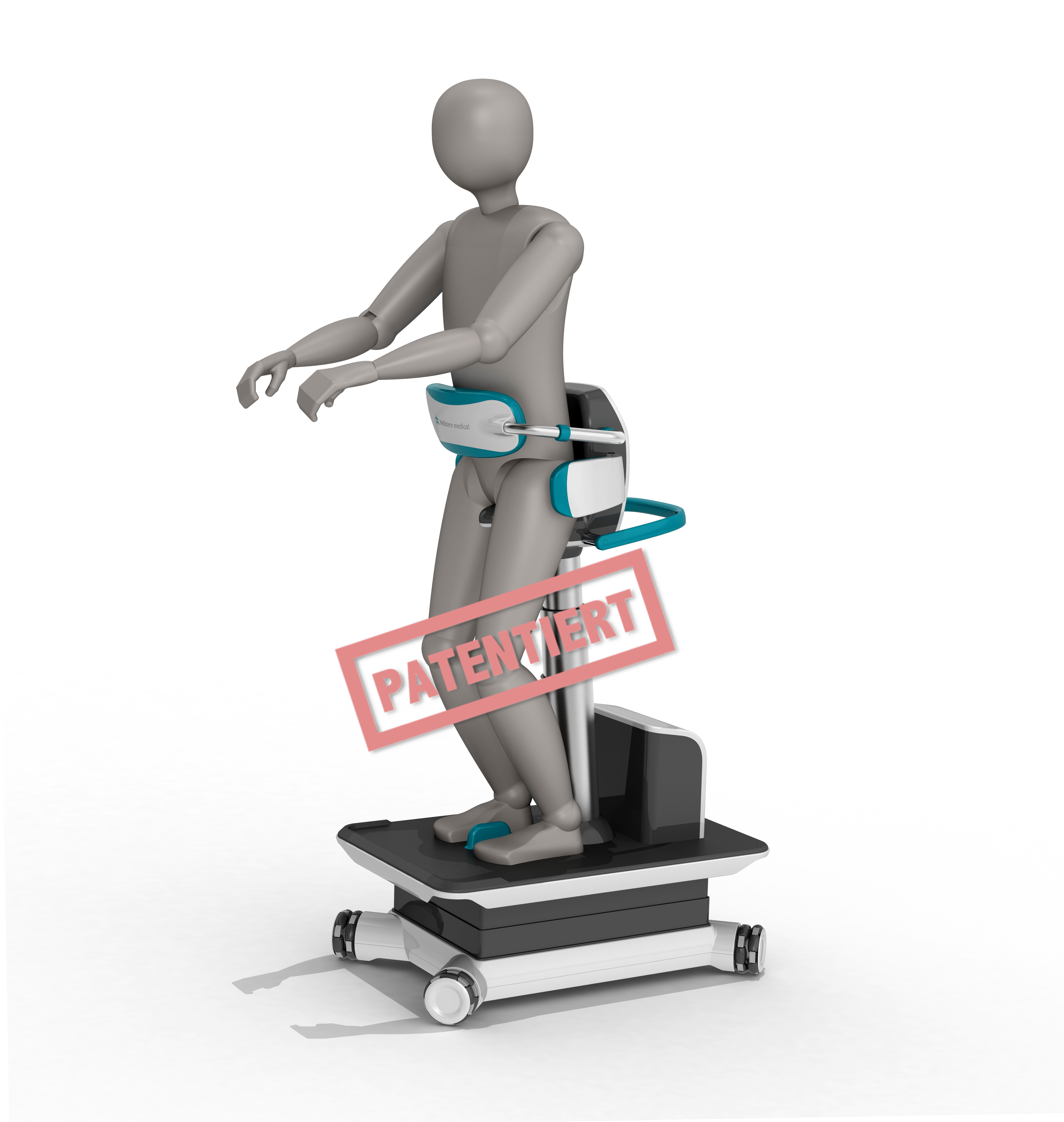Workplace of the future
Intelligent body support system for surgery staff
Operating room staff often spend hours in strenuous postures, which has a significant impact on concentration and quality of work. While operating room equipment is increasingly networked, state-of-the-art medical technology, conditions for operating room staff trail way behind. The start-up company Hellstern medical offers an effective solution for serious pain, fatigue and incorrect interventions.
Sabrina Hellstern has clearly hit on a good idea: her product not only appeals to surgeons, but is also gaining increasing public recognition. Soon after she set up Hellstern medical in 2019 she found herself highly placed in the Gründerpreis Baden-Württemberg, the Darboven IDEE prize and the WECONOMY founder’s contest. Now Reutlingen-based Hellstern medical is offering equity investments in the seed phase. What is behind the start-up idea?
Reduced precision due to tiring, forced postures
Hellstern has many years of experience in medical product sales and understands the needs of hospital staff very well. Feedback from many surgeons relating to the strain they experience whilst performing tiring daily routine work in ORs marked the starting point of Hellstern's analyses. Her conclusion: it is a global problem that seems to have changed very little over time, unlike the technological progress that has been achieved due to state-of-the-art equipment. "Surgeons today still perform their work at the operating table in strenuous postures, just as they did a hundred years ago," explains Hellstern. Surgeons are standing for up to eight hours for abdominal operations and twelve hours when it comes to brain surgery, with their upper bodies bent over and arms stretched out, sometimes in contorted postures.
Surgeons have been open about the strains of the workplace: Hellstern has learnt that tiring actions, repetitive movements and static postures result in what is known as surgical fatigue syndrome - declining concentration, precision and visual acuity. But that's not all: medical professionals have to stand on height-adjustable, hard steel steps to compensate for different body sizes, and this promotes vascular diseases and leads to faster muscle fatigue and thus declining concentration. The consequence? Operations take longer and treatment errors can occur. "75 percent of OR staff regularly suffer from severe pain and musculoskeletal disorders," says Hellstern. "A large proportion of OR staff take painkillers on a permanent basis. The employers' liability insurance association has been recommending standing aids for surgeons for years, but a profitable product has not been available. Many craftsmen's workplaces are designed more ergonomically, although in their case a mistake does not endanger human life."
Excellent support from the development team
 CEO Sabrina Hellstern and CFO Claudia Sodha of Hellstern medical GmbH. © Claudia Sodha
CEO Sabrina Hellstern and CFO Claudia Sodha of Hellstern medical GmbH. © Claudia SodhaWith the starting point established, it was time to hit the ground running. The medical technology expert studied requirements for operating rooms and, with much enthusiasm and a certain willingness to take risks, worked out a technical solution approach and a business plan. Although she did not yet have a budget, she built a highly skilled interdisciplinary team. She brought on board mechanical engineer Harald Hager and information technology engineer Alexander Strobel, both experienced designers who had already brought many medical technology products to the production stage. "The combination of process engineering, mechanical engineering, ergonomics and product development made the project extremely exciting right from the start," explains Hager. Claudia Sodha, an engineer and businesswoman, contributed her expertise in strategic development and financial issues, and the team was completed by Prof. Dr. Martin Schuhmann, senior physician at the Department of Neurosurgery at Tübingen University Hospital, and Dr. Felix Neunhoeffer, senior physician at the Department of Paediatrics and Adolescent Medicine in Tübingen. Both have accompanied every step of the development and tested individual prototype stages together with other surgical specialists, so that all the requirements of a wide range of disciplines are being covered.
Astronaut seat with a lot of free space
 The patented intelligent body support system Noah (upper body support only symbolic due to ongoing patent proceedings) © Andreas Weinberg (Ruf and Weinberg Design)
The patented intelligent body support system Noah (upper body support only symbolic due to ongoing patent proceedings) © Andreas Weinberg (Ruf and Weinberg Design)The 15-month optimisation process has resulted in a product ready for series production. The system looks like an astronaut's seat, but comes with plenty of free space. "Our intuitive and intelligent body support system is controlled by sensors." Hellstern describes it as a kind of fusion between operating chair and exoskeleton. It is called a noac - "not only a chair" . "The support system with height compensation enables surgeons of all heights and statures to operate ergonomically, standing or sitting. Relief is provided at specifically defined contact points." Thus, noac offers hip and thoracic support and enables fast and intuitive changes of position. The big advantage is that the flexible support means that the surgeon does not have to change his or her normal movements. Inclined postures are also possible due to the high variability of construction. "Developing noac was a challenge, but right from the start we were convinced it was a good idea," says Strobel, the IT engineer. Their efforts have paid off: studies have shown that working ergonomically with noac significantly reduces muscle fatigue and pain. The results from the randomised crossover study with medical volunteers from the occupational medicine and neurology departments of a university hospital will be published shortly.
The leap into the market
Having worked in the sale of medical products for many years, Hellstern has a great deal of experience with market launches: "Around 60 percent of a hospital's revenue is generated in the operating room. Any increase in efficiency therefore has a positive impact on profitability." After all, prolonged operations and treatment errors are costly. Noac has the potential to stop this from happening. In addition, the number of sick-leave days and costs due to empty operating rooms caused by skeletal and muscular disorders among staff can be reduced. Ultimately, it's all about patient safety: "In the future, patients may well be able to base their choice of clinic on whether assisted or conventional surgery is performed in the operating room. Because, of course, what patients want is faster, more precise and less risky operations," says Hellstern "Surgical robots cannot achieve this because they are too costly."
The company has secured itself a competitive advantage with patents, multiple product and financial planning awards. The unique selling point is obvious. "There is no comparable solution on the market and with the medtech giants in the USA and Europe, the market potential is in the billions. The feedback is very good, we have many development partnerships with hospitals and talks are ongoing with health insurance companies and employers' liability insurance associations," says Hellstern. Scaling is firmly in sight, as further plans for personnel and production are already underway.
The target market is defined. The company is now offering investment opportunities for seed financing and exit. "It is also important to us to share ideas about internationalisation strategies to help us move forward faster and better. If you think, for example, of lengthy brain surgeries in children, the only possible ultimate goal is that the surgeon is working under the best conditions when it comes to hand movements."